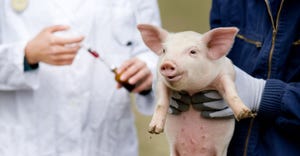Farm bill fails in the House
Legislative Watch: Farm bill fails; White House supports House farm bill; USDA urged to issue regs for lab-cultured proteins; more USDA leadership spots named.

The House of Representatives failed to pass H.R. 2, the “Agriculture and Nutrition Act of 2018” by a vote of 198-213. Members of the Republican Freedom Caucus had demanded a vote on immigration reform before they would vote on the farm bill. With 30 Republicans joining a united Democratic caucus, the House Republican leaders were not able to find the necessary votes to pass the bill. House Republican leadership is now trying to determine the next steps.
Republicans advocate the bill makes the necessary reforms to allow more able-bodied adults a pathway to work and provides support for producers with crop insurance, commodity programs and trade promotion programs. Democrats opposed to the bill argue it does not improve the farm safety net programs for farmers; the new Supplemental Nutrition Assistance Program requirements are cruel because it is estimated that over 2 million individuals will lose their SNAP benefits; and it reduces federal funding by nearly $800 million for voluntary conservation programs.
There are 51 amendments being considered during the debate. Bipartisanship has worked as Democrats and Republican members joined together to defeat various amendments that would harm agriculture. Those include:
• Sugar — The sugar amendment to make changes to the program was defeated by a vote of 137-278. This amendment, if passed, would have jeopardized final passage of the farm bill.
• Elimination of farm and crop insurance programs — Congressman Tom McClintock’s (R-CA) amendment which would have phased out subsidies for farm programs and crop insurance programs was overwhelmingly defeated 34-380.
• Bioenergy subsidy programs — Congressman Andy Biggs’ (R-AZ) amendment was defeated which would have ended the bioenergy subsidy programs established in the 2002 farm bill.
Other amendments being considered:
• Raw milk — The amendment by Congressman Thomas Massie (R-KY) was defeated 79-331 which would have allowed for the interstate shipment of unpasteurized milk and milk products between states that allow for the distribution of unpasteurized milk for direct human consumption. Amendment pending.
• Animal fight — Congressman Peter Roskam’s (R-IL) amendment strengthens prohibitions against animal fighting by ensuring the law applies to all U.S. territories was adopted.
• ARC and PLC sign-up — Congressman Darin LaHood’s (R-IL) amendment was adopted which allows producers to sign up for Agriculture Risk Coverage and Price Loss Coverage programs one time for the life of the bill or “one and done” instead of having to sign-up annually.
Amendment filed, but not offered:
• Checkoff reform — Congressman Dave Brat’s (R-VA) did not offer his amendment that would “reform” checkoff programs by placing major restrictions on checkoff programs. The amendment would have prohibited checkoffs from entering “into any contract or agreement to carry out checkoff program activities with a party that engages in activities for the purpose of influencing any government policy or action that relates to agriculture.” The Organization for Competitive Markets called on Congress to approve the amendment to “restore integrity to the checkoff programs.
However, 37 agricultural organizations stated their opposition to the Brat amendment in a letter to the House leadership saying “The amendment allegedly aims to improve the transparency and accountability of commodity checkoff programs, but should be soundly rejected because it takes control away from producers and will gut the programs that U.S. agriculture relies on to build demand for our products.” Those signing the letter include the National Pork Producers Council, National Cattlemen’s Beef Association, North American Meat Institute, American Soybean Association, and National Cotton Council.
The Senate Agriculture Committee is expected to release a bipartisan farm bill in the near future. The Senate bill will not include the new SNAP requirements contained in the House bill.
White House supports House farm bill
The administration’s “Statement of Administration Policy” stated the White House’s support for H.R. 2, the “Agriculture and Nutrition Act of 2018.” The statement says the new Supplemental Nutrition Assistance Program work requirements for able-bodied adults are a “critical component of any multi-year farm bill reauthorization.”
The administration supports the bill for eliminating the Conservation Stewardship Program and reducing “overly generous payments” to landowners who have acreage enrolled in the Conservation Reserve Program. H.R. 2 caps CRP payments at 80% of local land rental rates with the savings used to increase the limit on CRP enrollment from 24 million to 29 million acres.
The statement says the administration is concerned the House farm bill does not include additional reforms for farm and conservation programs that President Trump proposed in the administration’s Fiscal Year 2019 budget.
The Statement of Administration Policy is the official position of the White House on the House farm bill.
House FY ’19 ag appropriations bill and lab-cultured protein
The fiscal year ’19 agriculture appropriations bill passed by the House Appropriations Committee includes a provision directing USDA to issue regulations prescribing the type and frequency of inspection required for the manufacturing and processing of lab-cultured protein products. USDA is also to provide requirements necessary to prevent the adulteration and misbranding of these types of products.
USDA names more leadership positions
Secretary of Agriculture Sonny Perdue has announced additions to USDA’s leadership team.
• Chief of staff — Ray Starling will become the secretary’s chief of staff on June 1. Starling currently is a member of the White House National Economic Council where he covers agriculture. Previously, he served as legislative director to Sen. Thom Tillis (R-NC).
• Farm Service Agency — Richard Fordyce has been named administrator of the Farm Service Agency. Fordyce is the former Missouri director of agriculture.
• Agriculture Marketing Service — Bruce Summers will be the new administrator of the Agricultural Marketing Service. Summers has more than 30 years of experience working for AMS.
• Food Safety and Inspection Service — Carmen Rottenberg has been named administrator of the Food Safety and Inspection Service. Rottenberg has been serving as the FSIS deputy administrator since August 2017. Paul Kiecker has been named FSIS deputy administrator. Kiecker has 30 years of experience with FSIS where he started as a food inspector.
About the Author(s)
You May Also Like



